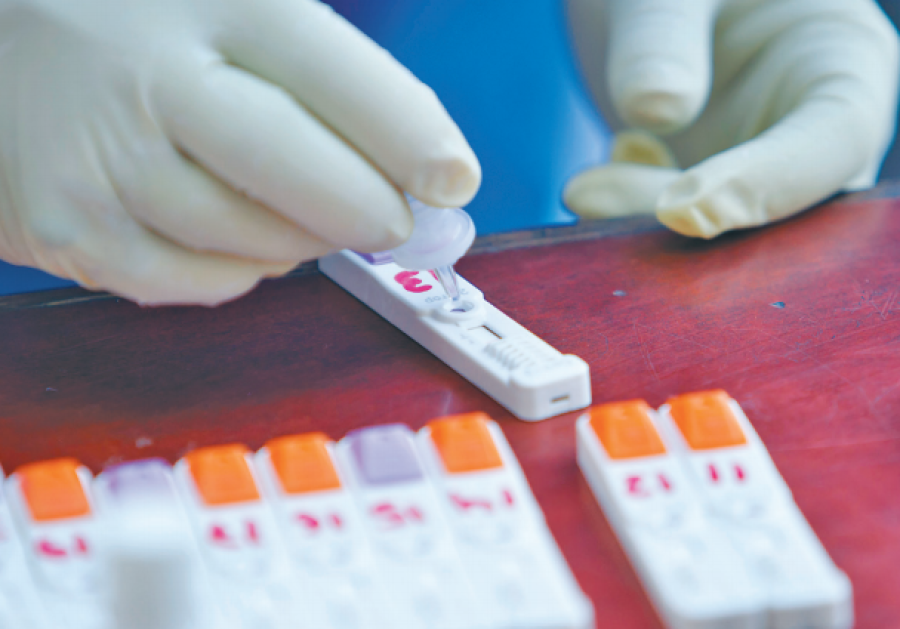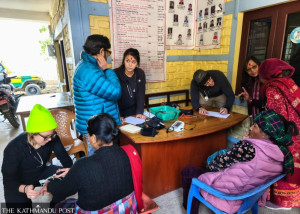Health
Antigen kits rolled out in hundreds of thousands but daily tests remain dismal
As pandemic reaches villages which lack PCR labs, antigen tests are the alternative. Health Ministry officials blame the reluctance of local officials for the lacklustre testing.
Arjun Poudel
Last week, the Health Office Dhading (earlier known as District Public Health Office) provided over 200 rapid antigen test kits to Benighat Rorang Rural Municipality. Health workers serving in the rural municipality, however, did not show interest in the antigen-based tests.
“Our priority is polymerase chain reaction tests,” Shankar Duwadi, health coordinator of the rural municipality, told the Post over the phone. “Polymerase chain reaction tests are more reliable than the antigen-based tests.”
Doctors say although there is no doubt that polymerase chain reaction tests are more reliable for coronavirus screening, for large-scale testing in rural settings and for quick results, antigen-based tests are equally important. And when new cases are spreading in remote villages, such tests are even more necessary to stem further spread of the infection and minimise the loss of lives.
Officials at the Health Ministry aimed to perform over 25,000 antigen tests every day along with the current number of polymerase chain reaction tests. However, antigen tests are being performed only in hundreds.
“Earlier, we could not increase testing due to limited capacity for PCR tests and lack of antigen test kits,” Dr Krishna Prasad Paudel, spokesperson for the Ministry of Health and Population, told the Post. “But now we have sufficient antigen test kits and have already dispatched them to the districts but test numbers have not increased.”
Officials at the Epidemiology and Disease Control Division said that the problem is not only the lack of budget and testing kits but also local officials’ mindset of not taking the risk seriously.
“When we received news about the spread of infections in Barpak of Gorkha district, health workers were deployed from provincial offices and the district for tests,” an official at the division told the Post, asking not to be named. “Hundreds of antigen tests were performed which showed infections in dozens of people.”
As per the national testing guideline for Covid-19, antigen-based testing is used in mass screening for urgent reports and for people living in congregate settings.
On Saturday, only 746 antigen tests were performed throughout the country, of which 176 tested positive. On Sunday, 1,784 antigen tests were performed and 667 people tested positive.
With the country’s daily polymerase chain reaction testing capacity of about 20,000 from 90 public and private laboratories, sufficient tests were not being performed despite new infections spreading throughout the country, especially in rural Nepal, and the positivity rate above 40 percent until last week.
After the government’s requests for help, aid agencies have supplied over 1.7 million antigen test kits.
On Sunday, 3,702 people tested positive throughout the country. The Health Ministry reported 109 more deaths. The dramatic decline in new cases can be considered as the result of a decline in test numbers. On Sunday, only 10,986 polymerase chain reaction tests were performed with the positivity rate at 33.7 percent.
Till about a week ago, around 20,000 tests were performed every day, of which around 8,000 returned positive.
According to Dr Samir Adhikari, joint spokesman for the Health Ministry, they are unaware of the reason behind the decline in test numbers.
“Maybe the number of people seeking tests has declined,” he said.
Public health experts say that testing is the first step to contain the contagion. They said that authorities could take containment measures only if they know where the infection is fast spreading.
“Without testing, authorities do not know about the scale of virus spread in communities and cannot start contact tracing,” Dr Keshab Deuba, a public health epidemiologist, told the Post. “Neither the suspected people can be placed in quarantine nor could the infected be kept in isolation.”
But in the lack of capacity, testing-based contact tracing has not been going on.
Duwadi, the health coordinator of Benighat Rorang Rural Municipality, said health workers have been collecting swab samples for symptomatic cases only.
As the infections have already penetrated deep into communities, testing only symptomatic people is the main reason behind the rapid spike in new cases, as the second wave of the coronavirus grips the nation, doctors say.
“I am tired of urging officials to increase testing,” Dr Binjawala Shrestha, a public health expert, told the Post. “Earlier, they did not increase testing saying that they do not have testing kits but now, when aid agencies have provided sufficient kits, they are not bothered to increase testing.”
Shrestha said that bureaucratic hassles and lack of seriousness on the part of authorities are the main reasons for the spike in new cases.
Health Ministry officials say all they can do is urge provincial and local governments to expand testing.
“We have also trained health workers and made officials of provincial and local governments aware about the need for antigen testing,” said Paudel. “We will hold meetings with them again and remind them about the need for testing.”
With infections already hitting communities, massive testing is required. Antigen tests will be helpful in figuring out the hotspots and clusters, letting authorities loosen up the restrictions in green zones and continue the restrictions in hot zones, according to experts.
They said that early detection and isolation of the infected is the only way to lessen the infection rate.
Increased testing also helps policymakers, enabling them to assess the scale of infections and allocate resources accordingly, doctors say.
“The burden of the infection may vary from place to place,” Dr Prabhat Adhikari, an infectious disease and critical care expert, told the Post. “When the authorities know the real burden, they can channel the measures and resources to the highly affected areas.”
Countries that were aggressive in testing, contact tracing and isolating the infected successfully checked the virus spread.
“Some local units like Kathmandu Metropolitan City and Dhulikhel Municipality have started testing and contact tracing,” Mahendra Prasad Shrestha, chief specialist at the Health Ministry, told the Post. “The local level should take initiatives to perform massive testing.”
As the spread of infections has been on the wane of late, testing helps to contain the contagion, he said.
“Even as the number of cases declines, cases could remain circulating within the communities if the chain of infections is not broken,” said the chief specialist at the Health Ministry. “And to break the chain of infections, we need to ramp up testing.”




 12.12°C Kathmandu
12.12°C Kathmandu














